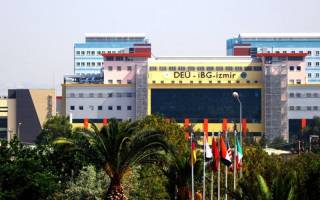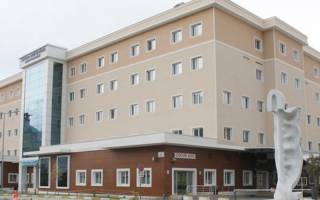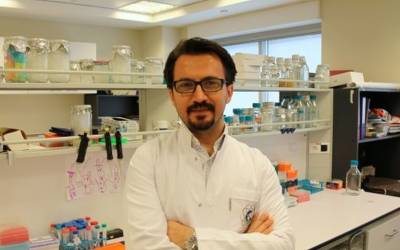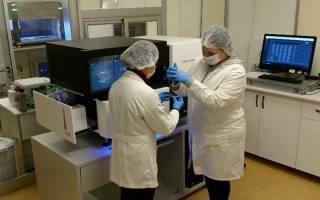Izmir Biomedicine and Genome Center and Institute (IBG)


Centre Principal Investigator:
Dr Yavuz Oktay, Assistant Professor of Molecular Biology and Genetics

Centre Principal Investigator:
Professor Uluç Yis,MD, Professor of Pediatrics and Pediatric Neurology (Clinical Lead for the ICGNMD in Izmir)
Co-Investigators (Izmir):

Ayşe Semra Hız, MD, Professor of Pediatrics and Pediatric Neurology
Ayşe İpek Polat, MD, Specialist of Pediatrics and Pediatric Neurology
Figen Baydan, MD, Associate Professor of Pediatrics and Pediatric Neurology
Gülden Diniz, MD, Associate Professor of Pathology
Berk Özyılmaz, MD, Specialist of Medical Genetics
ICGNMD Clinical PhD Fellow:
- Clinical neuromuscular expertise, patients and geographical region:
In the paediatric neurology clinic of Dokuz Eylül University’s School of Medicine, we examine approximately 6,500 patients annually. Neuromuscular patients constitute about 10-15% of this cohort. We examine around 10-15 new neuromuscular patients every month. We have a heterogeneous cohort of neuromuscular disorders due to consanguineous marriages in Turkey. Besides Duchenne muscular dystrophy (DMD) and spinal muscular atrophy (SMA) for which we are able to provide a genetic diagnosis, our cohort mostly includes limb girdle muscular dystrophy, congenital muscular dystrophy, congenital myasthenic syndromes, metabolic muscle disorders and hereditary axonal polyneuropathies. We can give definite genetic diagnosis to 20-30% of these patients.
Tepecik GDC is now one of the most advanced diagnostic centres in Turkey and supports 8 Medical Genetics Specialist MDs and 21 lab staff. Since 2010, Tepecik Genetic Diagnosis Center (GDC) has been conducting diagnostic services in the fields of Cytogenetics and Molecular Genetics in patients consulted by clinics in Tepecik Hospital and other hospitals in the Aegean Region. Approximately 25,000 patients are admitted to Tepecik GDC annually, and approximately 15,000 tests are performed. The patient cohort includes a substantial number of suspected neuromuscular cases, with over 700 outpatients. Within this cohort, a genetic diagnosis is currently reached for over a quarter of patients.
- Genetics and preclinical science expertise and facilities:
Izmir Biomedicine and Genome Center (IBG) is a recently-established biomedical centre of exceptional physical infrastructure over 20,000m2. The centre is equipped with state-of-the-art facilities including zebrafish and mouse facilities, high- resolution imaging and FACS cores, BSL3/ABSL3 facilities. Its genomics and bioinformatics facilities are equipped with NGS instruments and high-performance computing systems, as well as a biobanking facility.
At Tepecik GDC, for routine NGS diagnostic aims, an Illumina MiSeq and a Thermo Fisher Ion S5 NGS Systems are available. Apart from these, for Whole Exome/Whole Genome Sequencing and Non-invasive Prenatal Diagnosis, a BGISEQ-500 device (BGI) is also used. Tepecik GDC is the first and only lab in the country using Neuromuscular Disorders NGS panels for routine diagnosis.
For neuromuscular or neurometabolic diseases, TruSight Inherited Disease Gene Panel (Illumina) covering 552 genes is being used, with hundreds of samples processed to date. Whole exome sequencing was also introduced for undiagnosed cases in 2019.
In our cytogenetics lab, SNP based Microarray system from Affymetrix is used. In 2017, we published our first results which represented the largest number of Affymetrix Optima Microarray results in Europe and the first in Turkey.
- Current research programmes:
One of the major focus areas of IBG is Rare Diseases and we have strong collaborative ties with the Department of Paediatric Neurology in the Dokuz Eylul University Faculty of Medicine. The Neuro-Genomics Lab, also headed by Dr Yavuz Oktay, focuses on the underpinning genetic causes of rare diseases of the nervous system. His lab utilizes a wide array of methods and approaches (i.e. NGS, patient cell analysis, CRISPR etc.) to identify and model genomic variants that cause disease.
Professor Semra Hız and Professor Uluç Yiş at Dokuz Eylul University Pediatric Neurology have extensive experience in a wide spectrum of neurological and neuromuscular disorders. Together with collaborators in Malatya and Diyarbakir, Turkey, they have successfully established and performed deep-phenotyping of a 200-family cohort from consanguineous marriages. Genomic analyses of this cohort has identified about 20 new disease genes causing various neurologic and neuromuscular phenotypes. In collaboration with researchers at IBG and Tepecik GDC, they have been spearheading efforts in genomic analysis of such patients in Izmir and the Western part of Turkey.
- Top five publications from the past five years:
Yiş U, Diniz G, Hazan F, Daimagüler HS, Baysal BT, Baydan F, Akıncı G, Ünalp A, Aktan G, Bayram E, Hız S, Paketçi C, Okur D, Özer D, Danyeli AE, Polat M, Uyanık G, Çırak S. Childhood onset limb-girdle muscular dystrophies in the Aegean part of Turkey. Acta Myologica;XXXVII:p. 210-220.
Yiş U, Becker K, Kurul SH, Uyanik G, Bayram E, Haliloğlu G, Polat Aİ, Ayanoğlu M, Okur D, Tosun AF, Serdaroğlu G, Yilmaz S, Topaloğlu H, Anlar B, Cirak S, Engel AG. Genetic Landscape of Congenital Myasthenic Syndromes From Turkey: Novel Mutations and Clinical Insights. J Child Neurol. 2017 Jul;32(8):759-765.
Yiş U, Uyanik G, Rosendahl DM, Carman KB, Bayram E, Heise M, Cömertpay G, Kurul SH. Clinical, radiological, and genetic survey of patients with muscle-eye-brain disease caused by mutations in POMGNT1. Pediatr Neurol. 2014 May;50(5):491-7.
Karakaya M, Mazaheri N, Polat I, Bharucha-Goebel D, Donkervoort S, Maroofian R, Shariati G, Hoelker I, Monaghan K, Winchester S, Zori R, Galehdari H, Bönnemann CG, Yis U, Wirth B. Biallelic MCM3AP mutations cause Charcot-Marie-Tooth neuropathy with variable clinical presentation. Brain. 2017 Oct 1;140(10):e65.
Ozyilmaz B, Kirbiyik O, Koc A, Ozdemir TR, Kaya OO, Guvenc MS, Erdoğan KM, Kutbay YB. Experiences in microarray-based evaluation of developmental disabilities and congenital anomalies. Clin Genet. 2017 Oct;92(4):372-379.
Karaoglu P, Quizon N, Pergande M, Wang H, Polat AI, Ersen A, Özer E, Willkomm L, Hiz Kurul S, Heredia R, Yis U, Selcen D, Çirak S Dropped head congenital muscular dystrophy caused by de novo mutations in LMNA. Brain Dev. 2017 Apr;39(4):361-364.
- How the new international centre will benefit research and clinical programmes:
Turkey has one of the youngest and largest populations in Europe, with high consanguineous marriage rates and the population is composed of many ethnic backgrounds. The proposed project will contribute a great deal to understanding the genetic basis of neuromuscular disorders in Turkey. Through supporting research to increase the number of patients with a precise genetic diagnosis, we will increase our experience of clinical phenotypes and ability to provide prenatal diagnosis to affected families. Becoming a part of the new international centre could also help tremendously with strengthening collaborations between the centres in the UK, Izmir and Ankara. Long lasting benefits of the ICGNMD will include advancing the clinical and research capacity of the centres involved, which will mature in time into local centres of excellence on neuromuscular disorders.
 Close
Close

